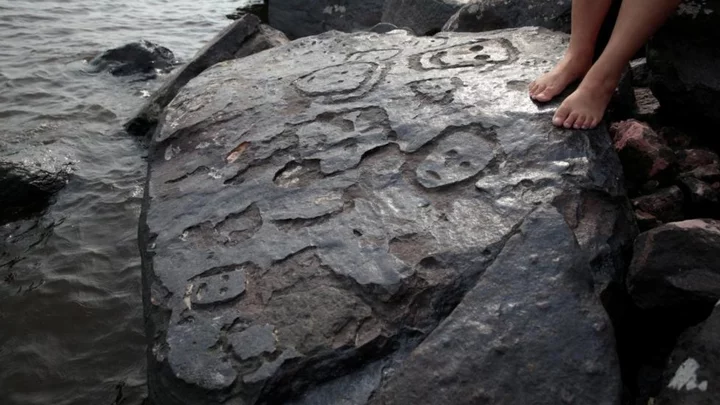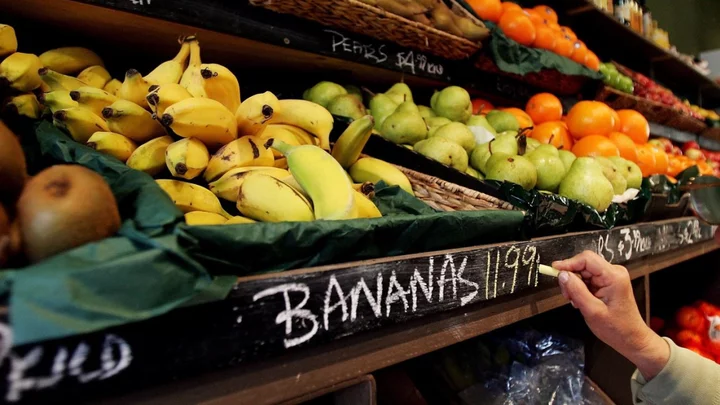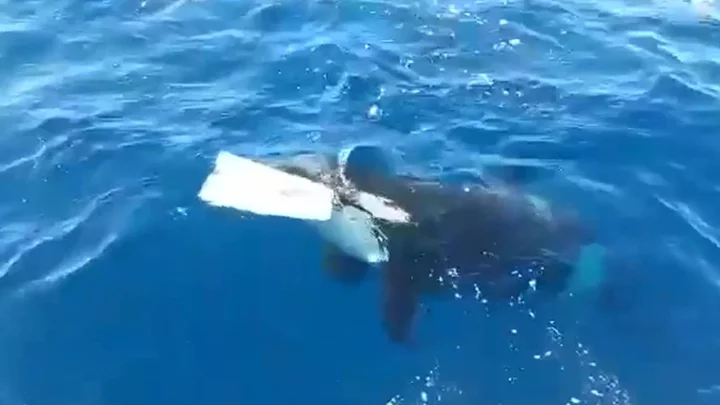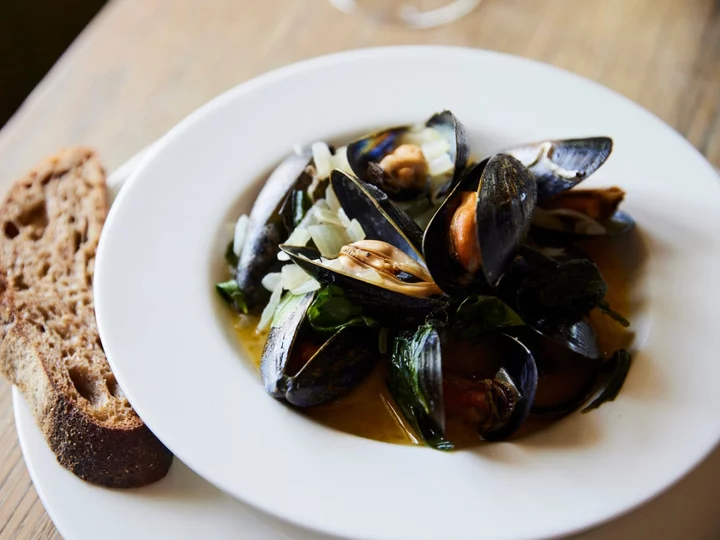
Roundup: Olivia Culpo Wants a Family With Christian McCaffrey; Rangers Head to World Series; NLCS Goes to Game 7
Olivia Culpo wants a family with Christian McCaffrey soon, the Rangers are going to the World Series, the NLCS is headed to Game 7 and more in the Roundup.
1970-01-01 08:00

Brazil drought reveals ancient rock carvings of human faces
The carvings of human faces on the shore of the Amazon are thought to be at least 1,000 years old.
1970-01-01 08:00

Scientists warn bananas could go extinct as disease ravages fruit
Bad news for banana lovers – scientists have warned that the fruit could face extinction, after a fungal disease outbreak. Crops of the Cavendish banana have been hit by an infection called Panama disease, with those in Asia, Africa, the Middle East, Australia and central America particularly badly affected. The disease, which is also known as banana wilt, starts in the roots of the banana tree and then spreads through its vascular system. Ultimately, it stops the plant from absorbing water or carrying out photosynthesis, eventually killing the tree. For Cavendish banana growers, it could spell disaster. While there are more than 1,000 varieties of bananas, about 47 per cent that humans eat are Cavendish. Cavendish has historically dominated the global banana market since the 1950s, partly because of its resistance to the main banana-killing diseases. It also has a long shelf life, making it more attractive for international import and export, and the plant also produces more bananas than other varieties on the same amount of land. Part of the reason scientists think it could be endangered is because of what happened to another popular banana variety called the Gros Michel. Gros Michel was the main export banana in the early 20th century, but was practically wiped out by a predecessor disease to the one hitting Cavendishes now. The first infections of Gros Michel farms began in the late 19th century and took several decades to affect production to the point where growers were looking for a new variety to sell. Cavendish, meanwhile, was first hit by the current strain of Panama disease in 1997, and it has now spread across several continents. However, scientists are working on a genetically modified version of the banana to fight to infection. James Dale, a professor and leader of the banana biotechnology program at Queensland University of Technology, is working on the project. He told Insider: “The disease moves slowly, so we have at least a decade before the impact is drastic.” “I would say with certainty that there will be a solution before the export market for Cavendish is severely affected.” Let’s hope he’s right. How to join the indy100's free WhatsApp channel Sign up to our free Indy100 weekly newsletter Have your say in our news democracy. Click the upvote icon at the top of the page to help raise this article through the indy100 rankings.
1970-01-01 08:00

Rio Ferdinand reveals 'two big factors' which have harmed Man Utd this season
Manchester United legend Rio Ferdinand has pinpointed 'two big factors' which have contributed to the team's underperformance so far this season.
1970-01-01 08:00

Rio Ferdinand defends Glazer family over Man Utd takeover saga
Manchester United legend Rio Ferdinand believes that the Glazer family were within their rights to reject Sheikh Jassim bin Hamad Al Thani's bid to buy the club. Sir Jim Ratcliffe is set to purchase a 25% stake in the Red Devils instead.
1970-01-01 08:00

Alexander Payne blasts 'damn long' movies
Alexander Payne thinks that modern films are too long and has called on directors to be economical with storytelling.
1970-01-01 08:00

Scientists think orcas might be getting smarter as they show frightening new behaviours
As if orcas weren’t frightening enough, experts think they are getting even smarter as they have started to learn some terrifying new behaviours. The whale species, commonly known as killer whales, is an apex predator that has learned to adapt its hunting methods to a variety of different prey. In March 2019, researchers were stunned when they witnessed the first documented case of a pod of orcas working as a team to kill one of the largest animals on the planet, a blue whale. The gruesome incident took place on the coast of southwestern Australia as experts watched as a dozen orcas bit chunks out of the adult blue whale, slowly wearing it down until it finally died an hour later. While it may have been the first recorded case, it has not been the last. Additionally, a small population of orcas on the coast of Spain and Portugal have become fans of ramming and damaging boats, sometimes causing enough destruction to sink them. Elsewhere, orcas have been seen abducting baby pilot whales and tearing the livers out of sharks that later wash up on shore. Deborah Giles, an orca researcher at the University of Washington and the nonprofit Wild Orca explained to Live Science: “These are animals with an incredibly complex and highly evolved brain. They've got parts of their brain that are associated with memory and emotion that are significantly more developed than even in the human brain.” But, while the actual anatomy of the animals’ brains hasn’t changed, their ability to learn is what is making orcas smarter than ever before. They implement what is known as social learning, where younger members of the pods observe and learn hunting methods from the adults, particularly the dominant matriarch, who themselves, are always learning. Josh McInnes, a marine ecologist at the University of British Columbia, explained: “This behaviour may be being shared between individuals, and that's maybe why we're seeing an increase in some of these mortality events.” But, while experts think they are getting smarter, they also think it may be leading to the breakup of large pods of orcas. Michael Weiss, a behavioural ecologist and research director at the Center for Whale Research in Washington state, said: “Their social bonds get weaker because you can't be in a big partying killer whale group if you're all hungry and trying to search for food.” Sign up to our free Indy100 weekly newsletter How to join the indy100's free WhatsApp channel Have your say in our news democracy. Click the upvote icon at the top of the page to help raise this article through the indy100 rankings.
1970-01-01 08:00

The Rock waxwork museum working on 'urgent' skin tone fix
Paris's Grevin museum promises to address concerns over the skin tone of its life-sized figure.
1970-01-01 08:00

Paddington in Peru heading to cinemas in 2024
'Paddington in Peru' is heading to UK cinemas on November 8, 2024, more than two months ahead of the US, when the motion picture will be in theatres from January 17th.
1970-01-01 08:00

Delhi pollution: Officials on alert as air turns 'very poor'
Experts have warned that the air quality in the city will further deteriorate in the coming days.
1970-01-01 08:00

Inquiry into New Zealand's deadliest shooting opens with memorial to victims
By Lucy Craymer WELLINGTON A coroner’s inquiry into New Zealand's worst mass shooting opened on Tuesday with a
1970-01-01 08:00

Jack Stein’s Cornish mussels with spinach and cider
For National Seafood Month (October) this year, I’d like to celebrate Cornish rope grown mussels and encourage more people to cook them at home. Juicy, sustainable, and nutritious, they are a lower-impact species but often consumed less than industrially caught seafood such as prawns, tuna, cod and salmon. They’re grown on long ropes out in St Austell Bay, and the best thing about them is they’re incredibly sustainable – feeding off the nutrient-rich water before being harvested, which means there’s no damage to any reefs or the shoreline. This also means they’re super clean with hardly any beards to cut off before cooking. They’re also great value at around a tenner for two decent bowlfuls, of which you can do so many recipes. I love classic moules marinière with onion, white wine and parsley, or, as below, mussels with spinach and cider – perfection! Mussels with spinach and cider Ingredients: 1.75kg mussels Handful of spinach leaves (when in season, these could be swapped for wild garlic) 2 shallots, finely chopped 15g butter 100ml Cornish cider, or your favourite local equivalent Plenty of crusty bread to soak up the sauce Method: 1. Wash the mussels under plenty of cold, running water. Discard any open ones that won’t close when tapped on a board. 2. Pull off any tough, fibrous beards attached to the tightly closed shells. Give the mussels another quick rinse to remove any little pieces of shell. 3. Soften shallots in the butter in a large pan. 4. Add the mussels and cider, turn up the heat, then cover and steam them open in their own juices for 3-4 minutes. Give the pan a good shake every now and then. 5. Add spinach and remove from the heat and allow to wilt. 6. Spoon into four large warmed bowls and serve with plenty of crusty bread. Jack Stein is chef director at Rick Stein Restaurants. You can buy Cornish rope grown mussels from Rick Stein online for £10. Read More Dear Pret, this is what a £7 sandwich should look like Pub grub: Three recipes from Tom Kerridge’s new cookbook From Nepal to Tibet: Eight warming dishes from the coldest places on earth Two seasonal stews to keep the chill off this autumn Farmers’ markets in autumn are a cornucopia of colour Spice up your life: Three recipes from Nadiya Hussain’s new book that bring the heat
1970-01-01 08:00
